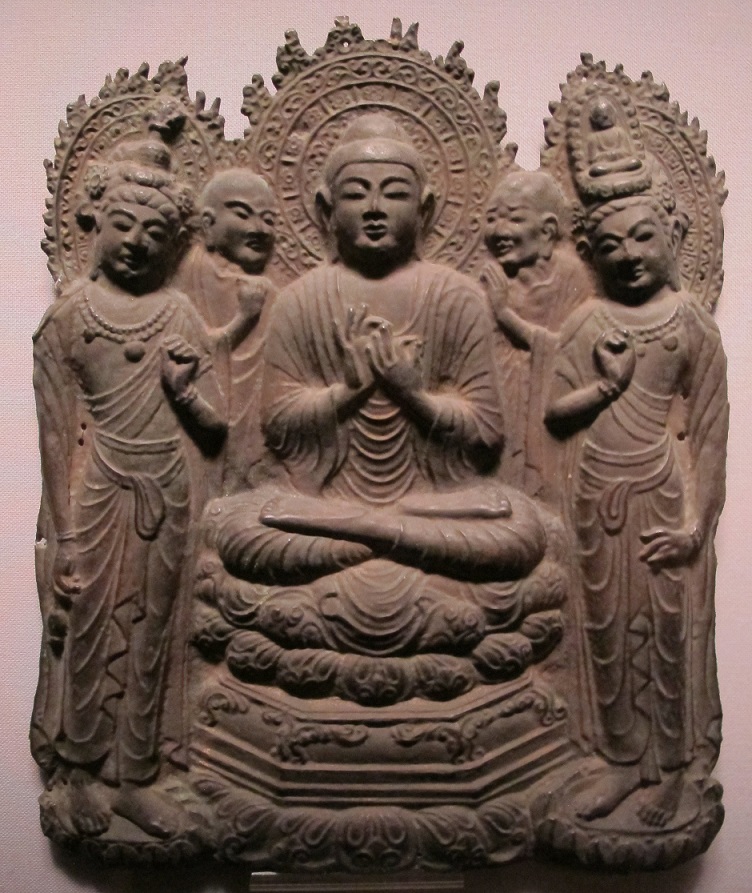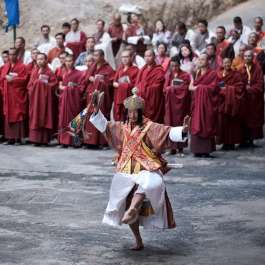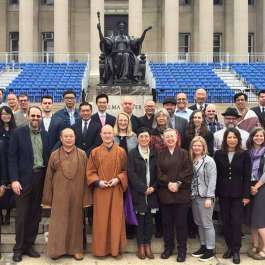
The role of Bodhichitta in Pure Land practice
Referring to Amitabha’s Fundamental Vow, Master Shandao identified Name-recitation to be the karma of assurance of rebirth. It is clear and definite that recitation of Amitabha’s name should be our only practice for guaranteed rebirth offered by Amitabha Buddha. We trust that it is the most direct and the easiest path that will ensure rebirth in the Pure Land because it accords with Amitabha’s Fundamental Vow. However, some Buddhists still have a measure of doubt about the importance of establishing bodhichitta (the intention to deliver all beings from suffering in the pursuit of Buddhahood) in connection with the practice of Amitabha-recitation.
Bodhichitta is understood to be the unsurpassed vow common to all bodhisattvas. As it is one of the fundamental teachings of the bodhisattva vehicle, namely Mahayana Buddhism, bodhichitta is certainly a basic practice for all Mahayana followers. Since Pure Land Buddhism is one of the Mahayana
schools of Buddhism, one would think it necessary for Pure Land aspirants to take bodhichitta as an essential practice, and even as one of the causal conditions for rebirth in the Land of Bliss.
This assumption is verified by the paragraph regarding the Three Tiers in the Infinite Life Sutra, which stipulates that all Pure Land practitioners in the highest, middle, and lowest tiers (on the Path of Importance) must: (1) establish bodhichitta; and (2) keep reciting Amitabha’s name exclusively, in order to attain rebirth in the Land of Bliss. Is it then true that these are the causal conditions necessary for beings to be reborn in the Land of Bliss?
Moreover, establishing bodhichitta is also one of the 11 specific practices among the Three Meritorious Deeds of the Path of Importance, associated with “self-power.” If Pure Land aspirants add this practice to or impose this condition on exclusive Amitabha-recitation for the purpose of attaining rebirth in the Pure Land, should they then be regarded as engaging in “mixed practice”?
The necessity of bodhichitta on the Path of Importance only
As regards this last question, the situation is similar to the case of filial piety and taking precepts, as discussed in my last article on confusion, doubt, and misunderstanding about “mixed practice” and “exclusive practice.” If Pure Land aspirants practice bodhichitta (as one of the 11 specific practices among the Three Meritorious Deeds) in order to cultivate, accumulate, and dedicate merit and virtue so as to be reborn in the Land of Bliss, it means they take the Three Meritorious Deeds as the main cause and the Nine Levels of Rebirth as the main practice. By definition, they are regarded as Pure Land aspirants who follow the Path of Importance for rebirth, in accordance with Amitabha’s 19th Vow.
Due to the fact that such practitioners cultivate various meritorious and virtuous practices and sincerely dedicate the merit with the aspiration to be reborn in the Land of Bliss, their practice is inevitably mixed and they are therefore regarded as engaging in “mixed practice.” In this respect, their rebirth in the Pure Land is not assured because “self-powered” cultivation of meditative virtue is involved. Even if they achieve rebirth in the Pure Land, they will remain inside a lotus bud for a certain time until conditions ripen for it to open fully.
On the other hand, if Pure Land aspirants sustain the exclusive practice of Amitabha-recitation according to the Path of the Great Vow, in other words, if they practice to attain rebirth in the Pure Land in accordance with Amitabha’s 18th Vow (the Fundamental Vow), it means that they take the Three States of Mind as the main cause and Amitabha-recitation as the main practice. The karma of Amitabha-recitation assuredly results in rebirth in the Pure Land because it depends entirely on the power of Amitabha’s Fundamental Vow. Practitioners of exclusive Amitabha-recitation attain the immeasurable and inconceivable merit and virtue of reciting Amitabha’s name, ensuring rebirth in the Land of Bliss and that the lotus in which they are reborn will blossom immediately.
Pristine Pure Land practitioners who exclusively recite the name of the resplendent Amitabha, with the immeasurable and inconceivable merits and virtues such practice produces, have already fulfilled the Three Sambhara* necessary for rebirth, or have already established the Three States of Mind, or have developed full faith in and acceptance of Amitabha’s deliverance. They have aspiration for rebirth in the Pure Land based on the grace of Amitabha Buddha. It is not necessary for them to add any practice like filial piety or taking precepts, or impose any condition, such as bodhichitta, on their single-minded and exclusive Amitabha-recitation.
Since both the Path of Importance (the Pure Land teachings expounded by Shakyamuni Buddha) and the Path of the Great Vow (the Pure Land teachings expounded by Amitabha Buddha) are Pure Land teachings leading to rebirth in the Land of Bliss, whether bodhichitta is one of the necessary causal conditions depends on the path selected by the practitioner. However, the Path of the Great Vow is always recommended by the Buddha Shakyamuni and the patriarchs, and is the practice of choice for all sentient beings.
Aspiration for rebirth in the Pure Land is basically the same as establishing bodhichitta
In Pure Land Buddhism, rebirth in Amitabha’s Pure Land is the basic goal of all practitioners. This aspiration is also one of the school’s guiding principles and characteristics.
As long as we exclusively recite Amitabha’s name and aspire to be reborn in his Pure Land, we are definitely assured of rebirth in the Land of Bliss, the unconditioned realm of nirvana. By the time we achieve Buddhahood, we will naturally possess the qualities of great kindness and compassion, great intelligence and wisdom, and great vow and power, and the Buddha’s supernormal powers.
At that time, we will be able to go to the worlds in the ten directions and effortlessly deliver sentient beings from suffering. Having attained Buddhahood, we can genuinely liberate sentient beings, ensuring their ultimate purity and happiness, and perfectly and completely fulfill the aspiration of bodhichitta. This is in fact precisely what is meant by bodhichitta. Therefore, in the context of the Pure Land teachings, aspiration for rebirth in the Pure Land is basically identical to establishing bodhichitta.
* Faith, aspiration, and practice






